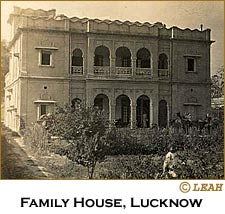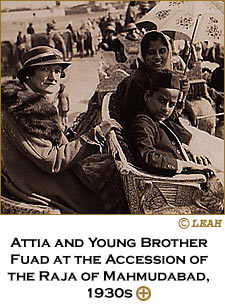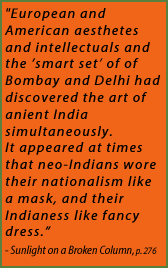4. Literature  ATTIA HOSAIN (AH): I had been a voracious reader of books. Alas, I can't read anymore, I can't concentrate but [then] I would read any book that I could lay hands on, fortunately at the time in my father's library, at the school and later at the college. There was then none of this that goes on now, that, "do you teach them Shakespeare or not?" One did learn it. One did learn the classics and read the classics.
ATTIA HOSAIN (AH): I had been a voracious reader of books. Alas, I can't read anymore, I can't concentrate but [then] I would read any book that I could lay hands on, fortunately at the time in my father's library, at the school and later at the college. There was then none of this that goes on now, that, "do you teach them Shakespeare or not?" One did learn it. One did learn the classics and read the classics.
I just loved literature. I had a wonderful teacher when I was at the school. So that apart from all the mathematics or anything, for me it was the books that mattered. And at the time in the 1930s, as you know, from the West came the influence of the Marxist point of view amongst intellectuals. So from here went people, who were like my own relatives. Closest to my father, were two people.  One was Dr. Syeduzzafar from Rampur [a princely state in U.P.], who was the Principal of Medical College and whose nephew is [Sahibzada] Yaqoob Khan [later Pakistani foreign minister]. And the other was Kunwar Bahadur Shah who was like something out of "The Prince," you see, of the Mughals and the Nawabs, in beautiful jamdanis [thin leggings], a kind of 'angharkas.' One was Dr. Syeduzzafar from Rampur [a princely state in U.P.], who was the Principal of Medical College and whose nephew is [Sahibzada] Yaqoob Khan [later Pakistani foreign minister]. And the other was Kunwar Bahadur Shah who was like something out of "The Prince," you see, of the Mughals and the Nawabs, in beautiful jamdanis [thin leggings], a kind of 'angharkas.' A little short, a person from the Hills near Nepal but totally one of those that I told you that for me there was no difference between who was Hindu, who was [Muslim]. My father died and he was a surrogate father. His son, who is alive, thank God to this day, is my brother now that I have lost my brothers because we had been brought up closer than blood brothers and sisters. Dr. Syeduzzafar Khan, a Saeed chacha [uncle] , was like a father to us when we were left [without a father]. My young brother [Air Commodore] Fuad [1928-68],, who became a legend in the Pakistan Air Force was born two months after my father died. So we needed these fathers and uncles and people. My mother certainly needed that support. 
These people [like] Saeed Chacha's son Mahmood [Mahmuduzafar, married to Rashida Jan, members of the Communist Party of India] came back from school, from here [England], a Communist like they all were. Sajjad Zaheer [a founder of the Progressive Writer's Movement], all that left wing lot of young men influenced my life but more than anyone Mahmood did. A man who was an idealist, an artist, a writer. He taught me how to read music and understand symphonies. I could play the piano - not too well but knew the theory of music - but not like that. He could read to me a bit of poetry and make it alive because I had never heard poetry in English, recited the way it should have been. At the same time he influenced me politically. So that I believed in the ideal sense in a world that could be created. From every side the influences were there. I did not ever become myself a person joining them because I used to say to Mahmood, you are all dogmatic in many ways. I don't even like my dogmatic Moulvis, so how can I like you? Because in my family by the way it related from the - I don't know which side whether my mother's - but we had these relatives in Farangi Mahal [a school of influential Muslim religious teachers who supported a united India]. Whereas you know Jamal Mian is now in Pakistan, you must know- QUESTION: I have met him. AH: They were the ones who influenced all thought and the Fatwas [religious edicts] and everything for the Sunnis. They were relatives and therefore as you can see the influences [on me] were like that, from all sides. But for me the main influence was that there has to be a world where they will not be injustice. That was when I was an idealist. Q: Religion did not play a part in your political life? AH: No, I believed in my religion but so what? I believed in a religion that to me never said you kill anybody. Never did I believe that religion taught violence because I think I had a very wonderful mother who by the way had set up a madrassah [Muslim religious school]. The first of its kind, where my sister went to teach because when my father died, my sister was taken out of school poor thing. I was young enough to stay on fortunately. She learned with the moulvi [Muslim prayer teacher], my sister did. But she used to go to the school where the girls were taught because my mother said if they are learning the Quran and namaaz [prayer] without understanding, that makes no sense. She had this little school where they were taught the translation [of the Quran] at the same time. These girls [were] from not rich families because there was a Muslim Girls College already existing backed by the Taluqdars and Muslims. They used to study there. It has now become, I believe, a part of a university. My family was like that, and I was taught religion. I think I must have been eight when I fasted for the first time and nobody believed me but I followed all the elders. To me religion was that, it was religion that was, well, drawing everybody together. It was never out of my mind that I was a Muslim. And now today when it is almost as if somebody is slapping you in the face and saying you are a Muslim. I am proud to say 'yes' I am. But please don't distort my religion - anyone, even the Muslims who now do distort it for their own purposes. > Image © The Literary Estate of Attia Hosain (LEAH) |
| SOUNDS
| HOME